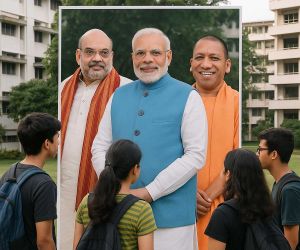MORE COVERAGE
Twitter Coverage
Satyaagrah
Written on
Satyaagrah
Written on
Satyaagrah
Written on
Satyaagrah
Written on
Satyaagrah
Written on
JOIN SATYAAGRAH SOCIAL MEDIA
In a world grappling with discord, PM Modi's address at the G20 summit shines a beacon of hope, drawing wisdom from India's yogic traditions & spiritualism, through tale of unity, the spirit of 'One Earth, One Family', Bharat exemplifies global leadership

In a clarion call for global unity and cooperation, Prime Minister Narendra Modi emphasized on Friday that a world mired in confrontation and strife serves no one's purpose. "A divided world cannot provide solutions to the major challenges facing humanity," he asserted.
Addressing the pressing need for collaboration in these tumultuous times, PM Modi remarked, “This is the time of peace and brotherhood, a time to move together. This is a time for growth and well-being of all. We have to overcome the global trust crisis and move forward with human-centric thinking. We have to look at the world in the spirit of ‘One Earth, One Family, One Future’.” His words came during the inauguration of the G20 Parliamentary Speakers’ summit, colloquially termed the P20 summit.
|
However, the Prime Minister didn't shy away from pointing out the looming threats that India has been grappling with. He shed light on the persistent issue of cross-border terrorism that India has endured for years, resulting in the tragic loss of thousands of innocent lives. Taking a trip down memory lane, Modi evoked the haunting memory of the terrorist attack on Parliament nearly two decades ago. A dire situation where terrorists had plotted to take MPs as hostages and potentially eliminate them while the Parliament was in session.
With these powerful recollections and forward-looking statements, PM Modi's address underscored the paramount importance of unity, trust, and collaboration in the current global landscape.
Having borne the brunt of multiple terrorist incidents, Prime Minister Narendra Modi reflected on India's resilience, remarking, “India has reached here today after dealing with many such terrorist incidents.” The global magnitude of the terrorism threat is now being recognized more than ever, he observed.
In a stern stance against this menace, PM Modi declared, “No matter where terrorism occurs, for whatever reason, in whatever form, it is against humanity.” Advocating for a determined approach in addressing terrorism, he emphasized the global dilemma where the world remains divided on even defining 'terrorism'.
|
Highlighting the procedural delays at international forums, Modi pointed out that the International Convention on combating terrorism remains in limbo, awaiting consensus at the United Nations. Such inertia, he cautioned, is being exploited by those that menace humanity. The Prime Minister made a fervent appeal to global parliamentary representatives, urging for a unified strategy in the battle against terrorism.
In a related note from the P20 summit, Canadian Senate Speaker Raymonde Gagne was notably absent from the event. This came as a surprise, especially since Lok Sabha Speaker Om Birla had previously confirmed Canada's participation in the summit. The reason behind this unexpected turn remains to be seen.
In response to the noticeable absence of Canadian Senate Speaker Raymonde Gagne at the P20 summit, External Affairs Ministry spokesperson, Arindam Bagchi remained tight-lipped, only commenting that the Canadian speaker “could not attend”.
Turning his attention to domestic matters, Prime Minister Modi addressed the controversial issue of electronic voting machines (EVMs). Despite the skepticism voiced by the opposition over the years, he championed the role of EVMs, crediting them for bringing "transparency and efficiency" to India's electoral process. Highlighting their efficacy, Modi pointed out that election results now become available merely hours into the counting process.
Looking ahead to the impending general elections next year, PM Modi shared the monumental figure of 1 billion potential participants. Seizing the moment, he extended an open invitation to the delegates present, urging them to experience the democratic spectacle first-hand.
Broadening the horizon to international diplomacy, PM Modi emphasized the necessity of inclusive decision-making on the global stage. He proudly announced the unanimous acceptance of his proposal to integrate the African Union into the G20, a significant move to ensure representation and equity. This inclusivity was further celebrated with the Pan African presence at the P20 forum, a fact that the Prime Minister warmly welcomed.
Emphasizing the significance of the summit's location, Prime Minister Narendra Modi highlighted to the gathering that they were convening in a land celebrated not just as the cradle of democracy but also as the world's most populous democratic nation.
|
Modi underscored the pivotal role of debates and deliberations in the democratic process, citing historical instances that exemplified these practices. He described the P20 summit as an unparalleled melding of diverse parliamentary traditions and methodologies from across the globe.
Touting India's accomplishments on the electoral front, he remarked, “India not only orchestrates the world’s grandest elections, but the engagement of the populace in these elections is also on an upward trajectory. We've seamlessly integrated the electoral process with contemporary technology.”
He further expounded on the primacy of civic involvement in addressing global adversities, stating, “No mechanism surpasses public engagement when it comes to grappling with the world's predicaments.”
Modi shared a profound belief that resonates with many leaders worldwide, “While governments are sculpted by majorities, nations are steered by consensus.” He envisaged this P20 forum, along with national parliaments, fortifying this very ethos. Expressing optimism, he believed that endeavors to refine the world through discourse and contemplation would indubitably bear fruit.
The event was graced by the presence of several eminent personalities, including Lok Sabha Speaker Om Birla and Duarte Pacheco, president of the Inter-Parliamentary Union. They joined a distinguished cohort of representatives from G20 Parliaments and specially invited nations.
|
Bharat at G-20: Reflecting the Yogic Spirit of Giving
The quintessence of India, often referred to as 'Bharat', is deeply rooted in its ancient yogic traditions. One such revered principle in this tradition is the idea of giving back more than what one takes. This isn't just a lofty ideal; it is woven into the very fabric of everyday life and even finds resonance in something as fundamental as the act of breathing. Inhaling life-sustaining oxygen and exhaling, giving back more than what we consume.
This yogic ethos was distinctly evident during Bharat's tenure as the president of the G-20 summit. The strategic decentralization of events, spanning the vast expanse of the country, was a testament to this spirit. Observers and participants alike were optimistic, foreseeing that Bharat would make a mark during its G-20 presidential tenure.
However, this optimism was not universally shared. A cursory glance at the opinion columns of various media outlets, especially those based in India, revealed a marked skepticism. Few believed that Bharat would achieve the remarkable outcomes it did by the end of its G-20 tenure.
This raises an essential question: why did a significant number of opinion writers in the Indian media, tasked with understanding and reflecting the public sentiment, misread the mood of the nation and the global community? It's high time for introspection. Why is there a disconnect between these writers and the spirit of the common people of Bharat? What makes them misjudge the global mood so starkly?
Bharat, as one of the most ancient nations, has consistently showcased an unparalleled ardor for guiding the collective conscience of humanity. Our essence is deeply rooted in compassion, a trait that we, as a nation, have exhibited time and again. The annals of our history shine brightly with countless episodes of magnanimity and leadership.
|
This inherent spirit was evident during the G-20 summit. As Bharat handed over the symbolic baton of its presidency to Brazilian President Lula, the very fabric of the G-20 had evolved. It wasn't just a mere assembly of nations; it had metamorphosed into something more – a G-20 plus one, to be precise.
The summit witnessed unanimous acceptance and declaration of resolutions on pressing global issues, from food security and climate finance to the peaceful resolution of conflicts. Every participating dignitary acknowledged these resolutions, and while many nations openly appreciated our efforts during the summit, a few powerful ones chose to extol our leadership post the event.
Such varied reactions resonate with our inherent belief in embracing diverse voices. Our unyielding faith in the ethos of unity in diversity sets us apart. It is this very culture that the people of Bharat have been championing, representing a harmonious confluence of nations, civilizations, and cultures throughout the annals of human history.
|
Leading a nation, especially one as diverse and layered as Bharat, is no simple feat. It demands a fine balance of tact, unwavering commitment to purpose, personal humility, and a collective leadership that stands firm even in the face of adversity. And when the nation's helm is steered by a Prime Minister who embodies the principles of a practicing yogi, the result is exemplary.
Bharat's ancient heritage has always been a guiding light, illuminating the path for humanity. Our core values are deeply embedded in compassion and selflessness, values we have upheld through countless eras. Time and again, our history has been punctuated by glorious moments that showcase our dedication to these principles.
The media, with its multitude of perspectives, will continue to dissect our achievements during this G-20 tenure. But there's one lens that transcends the rest – the spiritual lens. This viewpoint, deeply rooted in Sanatan Parampara (Indic Wisdom), encompasses all others. It recognizes the inherent unity amidst apparent contradictions, always prioritizing the innate threads of commonality that bind us all. This perspective, rooted in eternal trust in humanity's innate goodness, offers an enlightened view of our accomplishments and our unwavering journey forward.
|
In the vast tapestry of Bharat's spiritual heritage, the revered saints and seers stand as towering beacons, guiding generations with their profound wisdom and insights. Through eons, they have delved deep into the essence of humanity, drawing from their own personal journeys and from the shared experiences of their fellow luminaries. Through sat-sangs, informal gatherings, and the enlightening dialogues of the Upanishads, they have exchanged stories, revelations, and lessons.
At the very heart of this enduring tradition lies the practice of selfless observation. Spiritual seekers, over generations, have embarked on introspective quests, seeking to understand their place in the vast expanse of existence. As the world around us evolves, we, too, adapt our lifestyles, ensuring they align with the demands of contemporary times. Yet, the age-old Guru-shishya relationship remains a steadfast anchor, preserving the eternal spirit of relentless pursuit of inner truth. Even when the world at large seems to drift away from its core, this bond revives and rekindles the flame of innate goodness within us.
In the annals of our rich spiritual heritage, tales of divine incarnations, from Maryadaa Purushottam Bhagwaan Raam to Leela Purushottam Bhagwaan Krishn, resonate deeply. But it's not just about the heroes; the stories of adversaries like Raavan, Kamsa, and Raktbeej are equally compelling. These narratives offer a profound lesson: even those perceived as 'villains' share a divine origin. In their earlier incarnations, they too were one with the cosmos. By recounting these tales, we are constantly reminded of the inherent oneness that binds all of creation.
These aren't mere tales; they are spiritual anchors that tether us to a profound truth. They encourage introspection, urging us to dive deep within our own selves. And in those depths, we discover the beauty of innate goodness, the reality of eternal oneness, and the magic of divine inseparability. When we truly embrace this wisdom, reality unveils its boundless treasures.
The recent G-20 summit saw Yogi Bharat championing this very ethos. The message was clear: collective cooperation is the only path to global peace, progress, and prosperity. It's a call for the world to unite in spirit and purpose, drawing from the timeless wisdom of our ancient tales.
 Support Us
Support Us
Satyagraha was born from the heart of our land, with an undying aim to unveil the true essence of Bharat. It seeks to illuminate the hidden tales of our valiant freedom fighters and the rich chronicles that haven't yet sung their complete melody in the mainstream.
While platforms like NDTV and 'The Wire' effortlessly garner funds under the banner of safeguarding democracy, we at Satyagraha walk a different path. Our strength and resonance come from you. In this journey to weave a stronger Bharat, every little contribution amplifies our voice. Let's come together, contribute as you can, and champion the true spirit of our nation.
 |  |  |
| ICICI Bank of Satyaagrah | Razorpay Bank of Satyaagrah | PayPal Bank of Satyaagrah - For International Payments |
If all above doesn't work, then try the LINK below:
Please share the article on other platforms
DISCLAIMER: The author is solely responsible for the views expressed in this article. The author carries the responsibility for citing and/or licensing of images utilized within the text. The website also frequently uses non-commercial images for representational purposes only in line with the article. We are not responsible for the authenticity of such images. If some images have a copyright issue, we request the person/entity to contact us at This email address is being protected from spambots. You need JavaScript enabled to view it. and we will take the necessary actions to resolve the issue.
Related Articles
- In a historic decision, the Union Home Ministry to announce the enactment of the CAA today, marking a pivotal moment as Amit Shah ensures implementation before the Lok Sabha elections, prompting crucial meetings among state officials nationwide
- "Education is the development of power and ideal": India witnessed significant increase of 87% in MBBS seats, 105% in PG seats in last 8 years, 96% in GMC, 22 new AIIMS and projects for the upgradation of 75 Government medical colleges under PMSSY
- "Selfish interest is one of the most common obstructions to the advance of truth": India stands proud of new Parliament, yet opposition continues to create hurdles, testing resilience of a nation that refuses to be deterred from its path towards progress
- "War is costly, peace is priceless": India's pivotal role in BRICS is shaping the narrative amid Ukraine crisis, championing dialogue and diplomacy, its influence in fostering global harmony is becoming increasingly evident on the international stage
- "If saving money is wrong, I don't want to be right!": Central Vista to save the govt around Rs 1000 crore per annum in rent and other associated costs, still faced opposition from political parties, environmental activists and civil society organizations
- Gone are the days when electricity connections and uninterrupted supplies were alien things in Uttar Pradesh: State’s electrification proves that it takes a Yogi to light up a state left in darkness by the SP-BSP regime
- “From Gandhi to Godse; From lions sitting peacefully to Angry lions with bared fangs. This is Modi’s new India”: How 'liberals' get unrealistic to criticize Modi and their claim of changed National Emblem is nothing else other than an utter lie
- "In the seamless weave of history and innovation, lies the essence of timeless success": Selfie, hand-written letter, walk with PM, ‘Bhavishya ki Jhalkiyan’ and more: Pradhan Mantri Sangrahalaya generates ₹6 crore plus revenue in just 1 year, reveals RTI
- In a fiery speech in MP, PM Narendra Modi vehemently condemns the I.N.D.I Alliance's "hidden agenda" to undermine the age-old traditions of Sanatan Dharma, the bedrock of Bharat, amidst escalating remarks from DMK leaders stirring nationwide controversy
- In yet another milestone of BJP, Indian Railways First-Ever Freight Train Reaches ‘Rani Gaidinliu Railway Station’ marking a major breakthrough for railway authorities: Manipur
- Modi Govt lost the battle of Farm laws with protesting farmers
- 'Badhai ho India': India crosses one billion vaccination milestone
- "You cannot expect to get the effect when you neglect to create the cause": 73 years after his death it was Modi who finally brought back ashes of Shyamji Krishna Varma and his wife from Geneva as their last wish to be returned to an independent India
- "Share our similarities, celebrate our differences": India-Russia economic cooperation extended to payments domain hitting final nail in proverbial coffin of American Card companies, India accepts MIR, Russia accepts RuPay, VISA-MasterCard cry in agony
- PM Modi inaugurates rebuilt Shankaracharya samadhi in Kedarnath and said ‘Adi Shankara brought life to a sleeping civilisation, awakened Bharat to rise above caste boundaries’

























